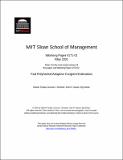Fast Polyhedral Adaptive Conjoint Estimation
Author(s)
Toubia, Olivier; Simester, Duncan; Hauser, John; Dahan, Ely
Download4171-01.pdf (323.4Kb)
Metadata
Show full item recordAbstract
Web-based customer panels and web-based multimedia capabilities offer the potential
to get information from customers rapidly and iteratively based on virtual product
profiles. However, web-based respondents are impatient and wear out more quickly.
At the same time, in commercial applications, conjoint analysis is being used to screen
large numbers of product features. Both of these trends are leading to a demand for
conjoint analysis methods that provide reasonable estimates with fewer questions in
problems involving many parameters.
In this paper we propose and test new adaptive conjoint analysis methods that attempt
to reduce respondent burden while simultaneously improving accuracy. We draw on
recent "interior-point" developments in mathematical programming which enable us to
quickly select those questions that narrow the range of feasible partworths as fast as
possible. We then use recent centrality concepts (the analytic center) to estimate
partworths. These methods are efficient, run with no noticeable delay in web-based
questionnaires, and have the potential to provide estimates of the partworths with
fewer questions than extant methods. After introducing these "polyhedral algorithms"
we implement one such algorithm and test it with Monte Carlo simulation against
benchmarks such as efficient (fixed) designs and Adaptive Conjoint Analysis (ACA).
While no method dominates in all situations, the polyhedral algorithm appears to hold
significant potential when (a) profile comparisons are more accurate than the
self-explicated importance measures used in ACA, (b) when respondent wear out is a
concern, and (c) when the product development and marketing teams wish to screen
many features quickly. We also test a hybrid method that combines polyhedral
question selection with ACA estimation and show that it, too, has the potential to
improve predictions in many contexts. The algorithm we test helps to illustrate how
polyhedral methods can be combined effectively and synergistically with the wide
variety of existing conjoint analysis methods. We close with suggestions on how
polyhedral algorithms can be used in other preference measurement contexts (e.g.,
choice-based conjoint analysis) and other marketing problems.
Date issued
2003-02-03Series/Report no.
MIT Sloan School of Management Working Paper;4171-01